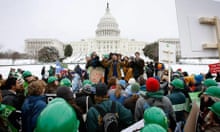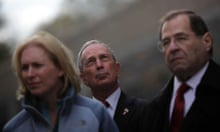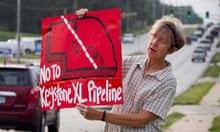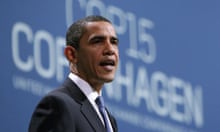The impact of the superstorm Sandy was felt directly on the presidential election on Thursday when the popular mayor of New York, Michael Bloomberg, threw his support behind Barack Obama, citing Republican challenger Mitt Romney's failure to back climate change measures.
Bloomberg combined his endorsement of Obama with a devastating attack on Romney for reversing his positions not only on climate change but on immigration, guns, abortion rights and healthcare.
His endorsement came as Obama received plaudits for his handling of the storm that has devastated New Jersey and New York and also hit Connecticut and West Virginia.
The mayor, writing about the damage caused to New York by Sandy, praised Obama for having made some progress towards tackling climate change. He noted that Romney, too, had supported climate change moves in the past but has since backed away from them.
In a powerful passage that can only hurt Romney, Bloomberg went on to write: "I believe Mitt Romney is a good and decent man, and he would bring valuable business experience to the Oval Office. He understands that America was built on the promise of equal opportunity, not equal results.
"In the past he has also taken sensible positions on immigration, illegal guns, abortion rights and healthcare. But he has reversed course on all of them, and is even running against the healthcare model he signed into law in Massachusetts."
Obama said he was honoured to have Bloomberg's endorsement. "I deeply respect him for his leadership in business, philanthropy and government, and [I] appreciate the extraordinary job he's doing right now, leading New York City through these difficult days," the president said.
"Mayor Bloomberg and I agree on the most important issues of our time – that the key to a strong economy is investing in the skills and education of our people, that immigration reform is essential to an open and dynamic democracy, and that climate change is a threat to our children's future.
"Just as importantly, we agree that whether we are Democrats, Republicans, or independents, there is only one way to solve these challenges and move forward as a nation – together."
Bloomberg's support comes after New Jersey governor Chris Christie praised Obama for his handling of Sandy. Although Christie is a Republican and a prominent supporter of Romney, he went out of his way this week to repeatedly praise Obama's leadership in responding to the crisis.
Bloomberg is an independent who had originally been a Democrat before switching to the Republicans in 2001. He won the mayorship as a Republican but fell out with the party in 2007.
He considered running as an independent in the 2008 White House election and commissioned polls in all 50 states, dropping the idea after finding insufficient support.
In his op-ed, Bloomberg brings climate change, largely ignored by Obama and Romney during the campaign, back to the fore.
"The devastation that Hurricane Sandy brought to New York City and much of the north-east – in lost lives, lost homes and lost business – brought the stakes of Tuesday's presidential election into sharp relief," he wrote.
He added: "Our climate is changing. And while the increase in extreme weather we have experienced in New York City and around the world may or may not be the result of it, the risk that it might be – given this week's devastation – should compel all elected leaders to take immediate action."
Obama had taken major steps to reduce carbon consumption and Romney too had a history of tackling climate change but had reversed course.
He said he was disappointed with Obama on many issues, listing among them healthcare reform.
"When I step into the voting booth, I think about the world I want to leave my two daughters, and the values that are required to guide us there. The two parties' nominees for president offer different visions of where they want to lead America," he writes.
"One believes a woman's right to choose should be protected for future generations; one does not. That difference, given the likelihood of supreme court vacancies, weighs heavily on my decision.
"One recognises marriage equality as consistent with America's march of freedom; one does not. I want our president to be on the right side of history."
He concluded: "Presidents Bill Clinton and Ronald Reagan both found success while their parties were out of power in Congress – and President Obama can, too. If he listens to people on both sides of the aisle, and builds the trust of moderates, he can fulfil the hope he inspired four years ago and lead our country toward a better future for my children and yours. And that's why I will be voting for him."
The Economist, which has a wide readership in the US, said in an editorial it had backed Obama four years ago and was doing so again. It regretted that Romney was too far removed from the centre.
"This newspaper yearns for the more tolerant conservatism of Ronald Reagan, where 'small government' meant keeping the state out of people's bedrooms as well as out of their businesses. Mr Romney shows no sign of wanting to revive it," it says.
It concludes: "For all his businesslike intentions, Mr Romney has an economic plan that works only if you don't believe most of what he says. That is not a convincing pitch for a chief executive. And for all his shortcomings, Mr Obama has dragged America's economy back from the brink of disaster, and has made a decent fist of foreign policy. So this newspaper would stick with the devil it knows, and re-elect him."
Fellow Republicans downplayed the significance of Bloomberg's endorsement. "It's not surprising to me. Bloomberg is a very liberal political figure," said George Pataki, the former Republican governor of New York.
Pataki also argued Romney would be "far better" than Obama in dealing with climate change.
Pataki during his time as governor was one of the creators of a regional carbon trading system – which is in partial collapse since Christie pulled out last year.
He said of Romney's position: "I think he is far better than Obama, who embraced the Markey-Waxman bill. That is the fear when you allow people like Pelosi and Reid and Obama to draft national legislation that is not so much aimed at climate change but at expanding government power and government revenue. I think Romney would be far better."











Comments (…)
Sign in or create your Guardian account to join the discussion